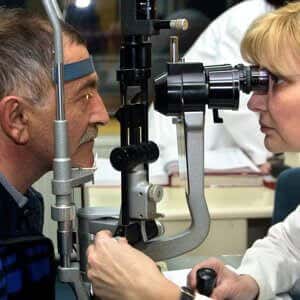
We sometimes get questions about when to take medicines. Does it matter whether you take them all at once, or do they need to be separated? (The correct answer to this question, unfortunately, depends on the specific pills.) Should you take them with food or on an empty stomach? And, of course, must you take them first thing in the morning, or can you take them at night? People are sometimes surprised to learn that it’s okay to take thyroid hormone (levothyroxine) before bed. Some blood pressure pills also work as well or even better when taken in the evening. That is worth considering, as you’ll read below. But, as an alert reader warned us, you should check with ALL your health care providers when making this decision. Glaucoma patients should be wary of nighttime blood pressure medications.
Taking Blood Pressure Pills at Bedtime:
Q. I take lisinopril and HCTZ to control my blood pressure. I took them at breakfast for 20 years and had decent BP readings but not consistently.
Last month I switched to taking them at bedtime, and I have seen a significant improvement with less variable results. The only exceptions were when I was doing taxes or trying to transfer files from an old computer to a new one. Once those two ugly things were done, I was back to steady and good.
A. Thanks for sharing your experience. Research has shown that bedtime may be better for taking blood pressure medicines (European Heart Journal, Dec. 21, 2020).
There is one very important exception. People with glaucoma should not take their blood pressure pills in the evening (Expert Opinion on Pharmacotherapy, Dec. 2020). If blood pressure drops too low overnight, glaucoma can worsen. (Journal of Glaucoma, April 2021).
Advice on Blood Pressure Pills Not Good for Glaucoma Patients:
Q. You wrote recently about the proper time of day to take medication for hypertension. The idea of medicating at bedtime is correct in most cases. This timing minimizes the risk of orthostatic hypotension [dizziness on standing].
However, there is a notable exception to that advice. One should avoid taking anti-hypertensive medications at bedtime if being treated for glaucoma, particularly low-tension glaucoma. Perfusion pressure to the optic nerve is normally greatly reduced at night. Reducing it further with blood pressure medicine dramatically increases the risk of optic nerve damage.
As a recently retired optometrist who treated many patients for glaucoma, I always consulted with the patient’s general physician. One would not want to increase the risk of advancing glaucoma by taking antihypertension medications at night. Such patients should take their medicines in the morning.
A. Thank you for alerting us to this complication. When blood pressure drops too low overnight, it may indeed pose a risk for glaucoma patients (Expert Opinion on Pharmacotherapy, Dec. 2020).
In glaucoma, pressure within the eye (intra-ocular pressure) damages the optic nerve. Usually this is due to a build-up of fluid in the eyeball. However, some people may suffer optic nerve damage even if the intra-ocular pressure is not very high. Because they risk vision loss if their hypertension is over-treated or if their overnight blood pressure is too low, they must get all their healthcare providers to work together for optimal results (Clinical Ophthalmology, Feb. 9, 2021).
Learn More:
To learn more about blood pressure management, you may wish to read our eGuide to Blood Pressure Solutions. For more information on glaucoma, you might listen to Show 1154: How to Take Good Care of Your Eyesight.
Citations
- Hermida RC et al, "Bedtime hypertension treatment improves cardiovascular risk reduction: the Hygia Chronotherapy Trial." European Heart Journal, Dec. 21, 2020. https://doi.org/10.1093/eurheartj/ehaa339
- Shukla AG et al, "Balancing treatments for patients with systemic hypertension and glaucoma." Expert Opinion on Pharmacotherapy, Dec. 2020. DOI: 10.1080/14656566.2020.1810235
- Tan BH et al, "Fluctuation in blood pressure and intraocular pressure in normal tension glaucoma using ambulatory monitoring." Journal of Glaucoma, April 2021. DOI: 10.1097/IJG.0000000000001768
- Beal B et al, "Comparing healthcare resource utilization and costs for patients with normal tension glaucoma across levels of severity: A retrospective cohort study."

